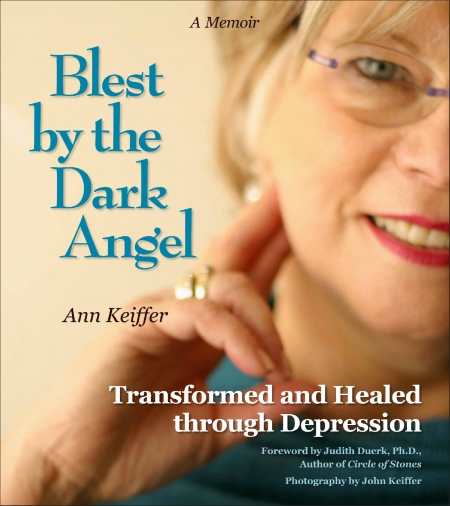
Blest by the Dark Angel
Keiffer’s struggles with depression challenge the rest of us to seek awareness of how our friend, family member, or coworker might be suffering.
Now a multimedia project incorporating her traveling photographic exhibit, Ann Keiffer’s revived and updated debut, Blest by the Dark Angel, is an eloquent, sympathetic, and courageous memoir about weathering depression.
Keiffer reflects that she courted success from a young age. A move to California provides her the perfect opportunity to pursue new dreams, all with the support of her husband, Larry, and son, John. There, she shapes an impressive career with an advertising agency out of her natural gift with words. The position, for a long stretch, is a fulfilling and validating endeavor.
But Keiffer’s neat world collapses one day when she finds herself unable to do so much as identify the coinage in her hands. Finally unable to ignore the protestations of her rebelling body, she’s forced to leave work indefinitely and confront a terrifying reality: she’s suffering from crippling depression. “I felt frayed and worn like a bad lamp cord,” she writes, “waiting helplessly [to] burst into flame.”
When discussing the implications of her disease, Keiffer is an unflinching wordsmith. From the outset, she makes it clear that surviving her darkest days came only through recognizing them as an opportunity. They were an outwardly lifeless cave into which she was lowered against her will, she reflects in one particularly powerful passage, but once she was able to look around carefully, she found that said cavern was adorned with metaphorical jewels. “When I am deadened with depression, I will move within my own breath … peel the world in an orange, pebbled glob, bite of zest,” in a poem that foreshadows her eventual regeneration.
Keiffer speaks of both the disease and recovery as physically painful and painstaking endeavors; the tactile, raw metaphors she uses throughout help to illuminate that journey. Those reading her book to understand battles with mental illness are likely to appreciate her candor, and the continual promise of a hopeful turn is sustaining.
Blest by the Dark Angel also examines how social and medical institutions work against facilitating mental well-being. She recalls the deficiencies of an impersonal HMO, the implications of rendering mental illness taboo, the failings of an assigned therapist who refused to see past her bravado, and the misfortune of close friends and coworkers being unable to read the signs of deep depression.
Thus, Keiffer’s pages also contain the bones of an assignment for the rest of us: that we be officious in securing a more open public space for addressing psychological troubles, all while engaging in the kind of self-conscious “being” that might have prevented her own collapse in the first place. On such topics, Keiffer is compelling.
An emotionally naked and starkly beautiful examination of depression, Blest by the Dark Angel is both an introspective personal account of collapse and recovery and a manual for necessary self-care.
Reviewed by
Michelle Anne Schingler
Disclosure: This article is not an endorsement, but a review. The publisher of this book provided free copies of the book and paid a small fee to have their book reviewed by a professional reviewer. Foreword Reviews and Clarion Reviews make no guarantee that the publisher will receive a positive review. Foreword Magazine, Inc. is disclosing this in accordance with the Federal Trade Commission’s 16 CFR, Part 255.
